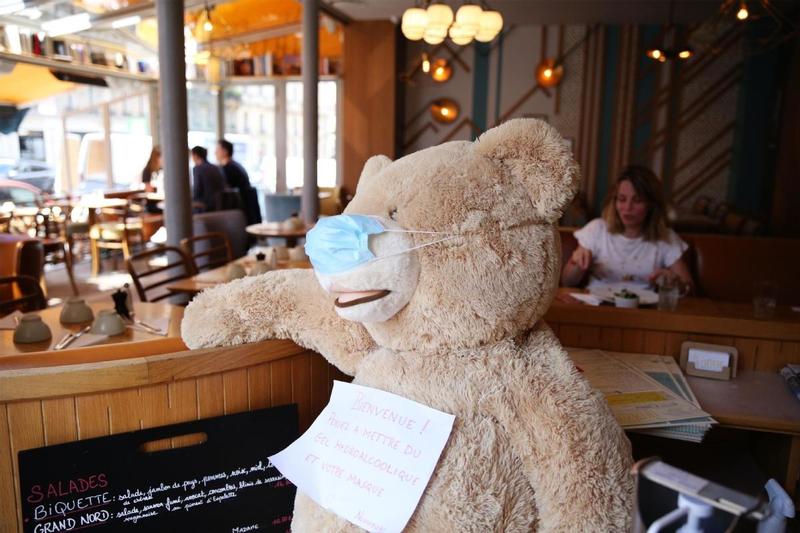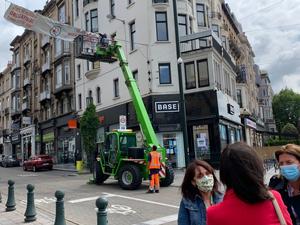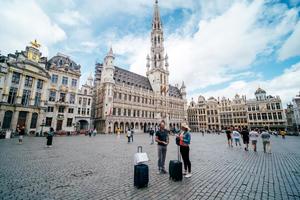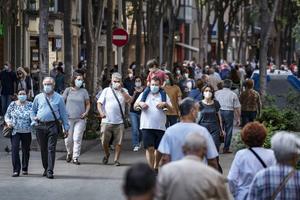New restrictions imposed amid resurgence of cases
 A toy bear at a restaurant in Paris, France, wears a sign stating: "Welcome. Please use the disinfectant and wear a mask." (GAO JING / XINHUA)
A toy bear at a restaurant in Paris, France, wears a sign stating: "Welcome. Please use the disinfectant and wear a mask." (GAO JING / XINHUA)
A worker on a telescopic boom lift was busy installing a banner across the entrance to a shopping street in Brussels, the Belgian capital, at lunchtime on Friday.
Written in French and Dutch, and hoisted over the Rue des Tongres, the banner stated, "Mask-wearing mandatory in this area".
We all know that Europe is not out of the woods yet, but it can now see dawn turning into light
Ursula von der Leyen, European Commission president
Instead of further easing lockdown measures, Belgium has experienced a rise in the number of COVID-19 cases in recent weeks. This follows several rounds of restrictions being lifted and borders opening to other European Union and Schengen Area member states.
On Thursday, Belgian Prime Minister Sophie Wilmes announced that new restrictions would be imposed two days later to stop the spread of the novel coronavirus. The restrictions include mandatory wearing of face masks in more public places. They are in addition to those enforced earlier on public transportation, and at shops, museums, cinemas, libraries and churches.
The latest rules also include a new closing time for shops staying open at night and stricter contact tracing efforts in bars and restaurants. However, an earlier decision to allow "social bubbles" of 15 people a week remains unchanged despite opposition from some experts.
 A banner stating "Mask wearing mandatory in this area" is hoisted over a shopping street in Brussels, Belgium, on Friday. (CHEN WEIHUA / CHINA DAILY)
A banner stating "Mask wearing mandatory in this area" is hoisted over a shopping street in Brussels, Belgium, on Friday. (CHEN WEIHUA / CHINA DAILY)
Wilmes, who took office in October as Belgium's first female prime minister, hopes that the 15-person limit will be observed.
"We must take action today so that we have no regrets tomorrow. We must act collectively. Everyone is an actor in this crisis," she said.
The new measures were announced as the Belgian public health institute Sciensano on Saturday reported that an average of 215.6 people per day had tested positive for COVID-19 in the past week, a 63 percent rise from July 15 to July 21.The number of cases is rising nationwide and across age groups.
The recent death of a 3-year-old from COVID-19, the youngest victim in Belgium, shocked the nation. The girl had underlying health conditions.
Boudewijn Catry, a spokesman for Sciensano and also an antimicrobial resistance researcher, said at a news conference on Friday, "This touches all of us deeply, whether we are scientists or parents."
On Saturday, Wilmes tweeted that Belgium's National Security Council would meet on Monday to assess whether additional measures need to be taken, adding, "A strong local approach is also fundamental for the most-affected areas."
Unlike many other EU states, which have admitted travelers from more than a dozen countries outside the EU and Schengen blocs since early this month, Belgium still prohibits non-essential travel to and from outside EU and Schengen nations.
With a population of 11 million, about half that of Beijing's, Belgium had reported 65,106 cases and 9,817 deaths from COVID-19 by Saturday, according to the World Health Organization.
A study last month by the Economist Intelligence Unit ranked the country's response to the pandemic as among the worst of 21 members of the Organisation for Economic Co-operation and Development.
 Visitors return to Brussels on June 28 after COVID-19 restrictions were lifted. (ZHANG CHENG / XINHUA)
Visitors return to Brussels on June 28 after COVID-19 restrictions were lifted. (ZHANG CHENG / XINHUA)
Widespread alerts
In addition to Belgium, many other EU member countries have witnessed a resurgence of cases, with the highest numbers on Saturday reported in Spain (2,255), France (931) and Germany (781).
On July 20, France made wearing face masks mandatory in all enclosed public places nationwide. Violators face a fine of 135 euros (US$151).
On Wednesday, La Rochelle, a popular tourist resort in southwest France, required masks to be worn on streets in the city center.
Unlike in the United States, wearing masks is not a divisive political issue in France and other EU countries. However, people continue to take the issue less seriously than those in some East Asian nations who experienced the outbreak of severe acute respiratory syndrome, or SARS, in 2003.
On Friday, French Prime Minister Jean Castex said on-the-spot COVID-19 tests would be required for travelers arriving from 16 countries where the novel coronavirus is spreading rapidly. However, he did not name the nations.
Castex, who took office on July 3, said travelers from countries where the infection rate is regarded as high will be subject to compulsory testing on arrival at French airports and seaports. Those who test positive will be quarantined.
Media reports quoted him warning the French public against traveling to the Catalonia region of Spain, where the number of cases has risen rapidly.
Castex, who in April was appointed coordinator for phasing out lockdown measures in France, said the country was in discussions with Spain about reducing traffic flow between the two nations.
France has the most deaths from COVID-19 in the EU and the sixth-highest number in the world, trailing the US, Brazil, the United Kingdom, Mexico and India. By Saturday, 30,078 deaths had been reported from the disease in France.
In Spain, about 8,000 cases were reported in Catalonia in the two weeks before July 23, about half the country's total new infections.
 Pedestrians wear face masks in Barcelona, Spain. (PHOTO / XINHUA)
Pedestrians wear face masks in Barcelona, Spain. (PHOTO / XINHUA)
On July 17, the Catalan regional government told some 4 million people, including all residents in Barcelona, to stay home and to avoid gatherings of more than 10 people. Bars and restaurants were ordered to reduce capacity levels.
Next day, police in Barcelona sealed access to many areas of the city's beaches after crowds decided to ignore the stay-home order and go sunbathing.
On Friday, the Catalan government announced that late-night bars and nightclubs would be closed for 15 days, starting the following day.
Jeffrey Lazarus, an infectious diseases expert at the Barcelona Institute for Global Health, told the media the real problem is not that people aren't wearing masks.
"It's those moments when they take them off-when they are at a bar, when they are at a restaurant, when they are at a family event-and that's where transmission starts to occur again," he said.
With 272,421 cases and 28,432 deaths from COVID-19 by Saturday, according to the WHO, Spain has the highest number of infections in the EU and the third-highest number of deaths after Italy and France.
Tourism, which accounts for 16 percent of Spanish GDP, is expected to take a hit from the new lockdown measures, with the UK announcing on Saturday that travelers arriving from Spain would have to be quarantined for 14 days.
In Germany, Michael Kretschmer, premier of the eastern state of Saxony, warned on Saturday, "The second coronavirus wave is already here."
He told the Rheinische Post newspaper, "We have new clusters of infection every day, which could become very high numbers."
The German government has stressed that the reproduction rate for the disease must remain below 1, but the most recent figure was 1.16.
German broadcaster DW reported that more than 60 percent of the new cases stem from a rebound in infections in the western state of North Rhine-Westphalia and in Baden-Wurttemberg in the southwest of the country.
It quoted health officials as saying that new COVID-19 clusters have been traced to large celebrations, leisure activities and workplaces, visits to community and health facilities, and travelers returning to the country.
On Saturday, Italy, which has also decided against opening its borders to non-EU states, joined a number of countries requiring travelers arriving from Bulgaria and Romania to undergo a 14-day quarantine period due to a rise in cases in these two nations.
More than 1 million Romanians and 60,000 Bulgarians work in Italy, mostly in construction, care for the elderly and agriculture, Bulgaria's Sophia Globe website reported.
 A couple dine behind protective screens at a restaurant in Paris last month. (PHOTO / XINHUA)
A couple dine behind protective screens at a restaurant in Paris last month. (PHOTO / XINHUA)
Recovery package
The new wave of COVID-19 cases has increased uncertainty about economic recovery in the EU.
In its Summer Economic Forecast report on July 7, the European Commission lowered its forecast for economic growth in the next two years for the 19-member eurozone and 27-member EU economy.
It predicted the EU economy would shrink by 8.3 percent and eurozone economy by 8.7 percent this year, compared with respective figures of 7.4 percent and 7.7 percent in the spring forecast in early May.
European Commission Executive Vice-President Valdis Dombrovskis indicated that the economic impact of lockdowns had been more severe than initially expected.
"We continue to navigate in stormy waters and face many risks, including another major wave of infections," the former Latvian prime minister said.
Italy, Spain and France, the three largest EU economies after Germany, are forecast to see the worst economic recession among eurozone members.
On Tuesday, EU leaders reached a deal on a 1.82 trillion euro recovery package after four days and nights of negotiations. The meeting had been scheduled to last two days.
The package comprises 1.07 trillion euros from the EU's long-term budget, known as the 2021-27 Multiannual Financial Framework, and 750 billion euros to be raised from the financial market, making it the largest joint borrowing in the bloc's history.
As a result of the compromise reached with the so-called Frugal Four-the Netherlands, Austria, Sweden and Denmark-plus Finland, the 750 billion euros portion will comprise 390 billion euros worth of grants and 360 billion euros in loans, instead of the previous respective figures of 500 billion euros and 250 billion euros.
The deal must be approved by the European Parliament by the end of this year.
European Council President Charles Michel told Members of the European Parliament, or MEPs, on Thursday that the agreement is "of course a deal which covers financial matters".
He added, "What we have done is to renew our European marriage vows for the next 30 years."
European Commission President Ursula von der Leyen said, "We all know that Europe is not out of the woods yet, but it can now see dawn turning into light.
"We now have the opportunity to achieve something historic for Europe together," she told MEPs.
On Thursday, a majority of MEPs voted against endorsing the EU budget deal if it was not improved. Some opposed the cuts in grants and flagship EU programs, ranging from climate protection and digital transition to health and border management. Others said there should be a clear mechanism linking EU financing to respect for rule of law.
The result of the resolution was 465 in favor, 150 against and 67 abstentions.
The EU leadership, which assumed office in December, is eager to prove its competence by surviving and thriving amid the coronavirus challenge and that posed by Brexit. Some members worry that a trade deal between the bloc and the UK is looking less likely to be reached before the end of this year.
Michele Geraci, former undersecretary of state at the Italian Ministry of Economic Development, attributed the long "acrimonious negotiations on the condition of help" for the recovery package to the EU's "weakness and lack of solidarity".
Italy and Spain are expected to be among the major beneficiaries of the package.
Geraci said the EU now faces many political and economic challenges.
"We are in the middle of the worst economic crisis since World War II and we have no means to face it, nor the speed of execution that is required," he said.
Euronews and Brussels Times contributed to this story.


